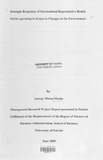| dc.description.abstract | Changes in the operating environment of organizations are unavoidable. Changes can
come about as a result of improvements in technology, realignment of government
policies and strategies, increases in competition, globalization, liberalization and
HIV/AIDS among others. Organizations respond to these changes by crafting
strategies which guarantee sustainable strategic advantage in spite of the changes in
their operating environments. This study evaluates challenges facing Non
Governmental Organizations (NGOs) within the Reproductive Health in Kenya as a
result of changes in their operating environment and the strategic responses to these
challenges.
The main objectives of the study were to determine the challenges facing
Reproductive Health NGOs as a result of HIV/AIDS and to find out the strategic
responses by Reproductive Health NGOs to the environmental challenge of
HIV/AIDS. The study was designed as a survey research of NGOs involved in
reproductive health. The study population consisted of all NGOs involved in the
reproductive health field. A random sample of 30 organizations was drawn from this
population and data obtained from questionnaires mailed to respondents within the
selected organizations. Data were analyzed using descriptive statistical methods and
means, standard deviations, frequencies and percentages computed. These statistics
were then presented in frequency distribution tables.
The major findings of the study are that changes in the operating environment that are
attributable to HIV/AIDS have resulted into higher medical and operating costs for
most organizations. Most organizations have responded to these changes by
developing HIV/AIDS strategies and polices. These polices have been generally
effective in dealing with challenges brought about by HIV/AIDS. It is concluded that
HIV has generally had effects on the operating environment of reproductive health
NGOs. HIV IAIDS has increased the costs associated with healthcare in these
organizations and has also resulted into increases in training costs It is also concluded
that reproductive health NGOs have effectively developed strategies to counter the
changes in their operating environment. | en |

